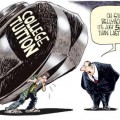 A new survey to be released later this year shows that political leaders and some pundits may have overstated the public’s dissatisfaction with attaining higher education degrees that aren’t in hot fields.
A new survey to be released later this year shows that political leaders and some pundits may have overstated the public’s dissatisfaction with attaining higher education degrees that aren’t in hot fields.
The repeated assertion by many is that the public is questioning the value of higher education as the cost increases. They also question whether getting a degree leads to a job.
For example, in Florida, Gov. Rick Scott has said that higher education needs to focus more on providing training for jobs that are hiring, according to Inside Higher Ed. The publication also pointed out that President Barack Obama even seemed to be pushing people to earn degrees with practical applications when he took a dig at those who earn art history degrees.
According to Inside Higher Ed, some of the findings of the new report – which has yet to be released – were revealed earlier this month by William V. Muse, president of the National Issues Forum Institute, at the winter meeting of the American Association of State Colleges and Universities.
The survey was conducted by the National Issues Forum in partnership with the Kettering Foundation and Public Agenda. In his presentation, Muse said the survey results indicated “leaders have underestimated the value that families and students place on college as somewhere that students can receive a rich and broad education.
“They’re concerned about the movement toward specific job training at the exclusion of these broader goals.”
The report works off information gathered at 115 forums held in 2012 and 2013. At each forum, groups of current college students, college instructors, parents and employers were presented with three different scenarios about higher education: that it should focus on training students for in-demand vocations; that it should focus on helping students develop communication and critical thinking skills; or that the focus should be on lowering the cost, particularly through the use of online education.
The largest group – 89% of respondents – said that college should be the place where students are given a well-rounded education that includes history, arts and literature, economics and philosophy. About 75% also said college should prepare students for in-demand fields, such as STEM careers (science, technology, engineering and math).
Also going against public rhetoric, many participants questioned whether it is wise to encourage all high school students to move on to higher education, particularly four-year colleges.
Muse said the report concluded that people know they want a broader education from college – because without those skills “it will be difficult for them to move from jobs that have become obsolete.”





